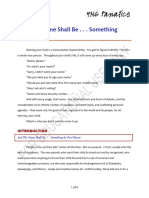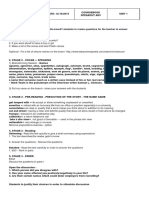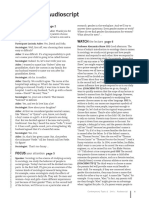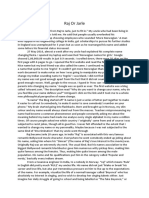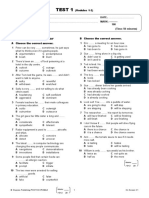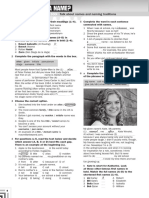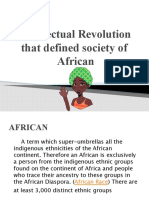My Name Is Unique
Uploaded by
sitrisitri1212My Name Is Unique
Uploaded by
sitrisitri121224 Hello, My Name Is Unique
CARLIN FLORA
Formerly a senior editor and writer for Psychology Today, where this article was first
published, Carlin Florin has degrees from the University of Michigan and the Columbia
University Graduate School of Journalism. Her current project is writing a book on how
friends influence our lives. Does one’s name alter one’s self-perception? This is the ques-
tion Flora raises in this article. Parents are increasingly giving their children distinctive
names based on the assumption that such names can influence a child’s destiny. The
original article included a sidebar with dozens of names in alphabetical order from the
Class of 2022 (that is, children born in 2004). Among them are Atom, Chianti, Desperate,
Gator, Jaguar, Maverick, Poppy, Reality, Skyy, Sy’rai, Tookie, Unique, and Xerox, to cite
just a few.
Vocabulary Analysis
WORD The Greek prefix homo- The adjective homogeneous is formed from the Greek prefix
FAMILIES homo- (“same”) and genos (“kind”). The adjective thus describes people who are
alike in their characteristics, whether by virtue of their age, interests, gender,
political preferences, or some other characteristic. Other words beginning with
this prefix are homonym, words that have the same sound but different meanings
(like cash and cache, or sew, sow, and so) and homosexuality, a sexual preference for
a person of the same sex. But be careful not to confuse the Greek prefix with the
Latin one, which, unfortunately, may be spelled the same. In Latin homo means
“man,” as in homicide or homo sapiens.
In your dictionary, look up the word homophonic. What does it mean? What are
the word parts? Does the prefix homo- come from Latin or Greek?
homophonic _________________________________________________________________
idiosyncratic [paragraph 3] The adjective idiosyncratic and the noun idiosyncrasy also
derive from Greek word parts, and though there are only a few words in Eng-
lish beginning with idio-, they form an interesting group. The prefix idio- means
311
spe07319_part04_265-362.indd 311 8/30/12 8:43 AM
312 CARLIN FLORA
“own” or “private.” An idiosyncrasy is a characteristic that is peculiar to a particu-
lar person or group. For example, Pierre, the husband of my friend Therese, will
not allow onions in their house. The eighteenth-century German writer Friedrich
Schiller kept a bag of rotting green apples in his desk drawer because he thought
that the smell inspired him to write. These are idiosyncrasies. Three other words
in this family are these:
idiom an expression peculiar to a particular language
idiot a foolish or stupid person, now offensive, from Greek idiotes (“a private
person”)
idiopathic describing a disease with no particular cause, in other words, a disease
peculiar to a particular individual
CARLIN FLORA
Hello, My Name Is Unique
1 Proper names are poetry in the raw, said the bard W. H. Auden. “Like all poetry,
they are untranslatable.” Mapping your name onto yourself is a tricky procedure
indeed. We exist wholly independently of our names, yet they alone represent
us on our birth certificates and gravestones.
2 Would a Rose by any other name be just as sweet-tempered? Does Orion feel
cosmically special? Psychologists, parents and the world’s Oceans, Zanes and
Timothys are divided on the extent to which first names actually matter.
YOU NAMED HIM WHAT?
3 Today’s parents seem to believe they can alter their child’s destiny by picking
the perfect—preferably idiosyncratic—name. (Destiny, incidentally, was the
ninth most popular name for girls in New York City last year.) The current crop
of preschoolers includes a few Uniques, with uncommonly named playmates
like Kyston, Payton and Sawyer. From Dakota to Heaven, Integrity to Serenity,
more babies are being named after places and states of mind. Names with alter-
native spellings are on the upswing, like Jaxon, Kassidy, Mikayla, Jazmine and
Nevaeh (Heaven spelled backward), as are mix-and-match names such as Ash-
lynn and Rylan.
4 “For the first time in history, the top 50 names account for less than 50 per-
cent of boys born each year, and for less than 40 percent of girls,” says Cleveland
Kent Evans, professor of psychology at Bellevue University in Nebraska and
author of Unusual & Most Popular Baby Names. Evans believes that our homoge-
neous strip-mall culture fosters the desire to nominally distinguish our children.
He cites a boom in unique names dating to the late 1980s but says the taste for
obscure monikers developed in the 1960s, when parents felt less obligated to
keep certain names in the family.
spe07319_part04_265-362.indd 312 8/30/12 8:43 AM
Hello, My Name Is Unique 313
5 “It’s really hard to name a kid,” says Jill Bass, 35, who is expecting her sec-
ond child. “It reflects what kind of person you are.” She and her husband, Carl
Vogel, 37, are struggling to find a name that is unique but not too trendy. “We
don’t want to go the Jake, Zak and Tyler route,” says Bass. “It will sound like
one of those year-2000 names. We don’t want to sound as though we were trying
so hard.”
6 Distinguishing a child in just the right way is the first task parents feel
charged with. Accordingly, parents-to-be increasingly track the popularity of
names on the Social Security Administration’s Web site and canvass the cottage
industry of baby-name books. About 50 such books were published between
1990 and 1996. Since 1997, more than 100 new books have been published.
7 New parents rattle off diminutives and acronyms as if reciting scales. “I
wanted a truly awesome, convertible name that could collapse into a normal
name. Something like Charles Henry Underhill Grisham Sernovitz, because
CHUGS would be a great college nickname,” says Andy Sernovitz, 33, whose
son Charles Darwin Grisham Sernovitz was born last November. Darwin was a
nod to mom Julie Grisham’s science-writing vocation.
8 Today, children are christened in honor of sports teams, political parties,
vacation spots and food cravings. Adam Orr, a die-hard Cubs fan, wanted to
name his first child Clark Addison or Addison Clark, the names of the streets
that form the intersection at Chicago’s Wrigley Field. Alas, he and his wife,
Annisa, are expecting a daughter this spring. Records of kids named Espn tell of
parents with a more general love of sports. Christie Brinkley reportedly named
her youngest child Sailor as a tribute to a favorite pastime. Jamie Oliver, the Brit-
ish culinary star, christened his child Poppy Honey, not nearly so unfortunate a
name as that of a poor soul dubbed Gouda.
9 Increasingly, children are also named for prized possessions. In 2000, birth
certificates revealed that there were 298 Armanis, 269 Chanels, 49 Canons, 6
Timberlands, 5 Jaguars and 353 girls named Lexus in the U.S. The trend is not
surprising: In an era in which children are viewed as accessories, such names
telegraph our desire for creative, social or material success. It would be ironic if
young Jaguar or Lexus grew up to drive a Honda Accord.
10 While a name may be a palimpsest for parental aspirations (hence the con-
cerns of savvy parents that they not appear to be striving too hard), a name
also reflects high hopes for the child himself. Choosing an uncommon name is
perceived as an opportunity to give your child a leg up in life, signaling to the
world that he or she is different. In Snobbery, cultural critic Joseph Epstein argues
that a child named Luc or Catesby seems poised for greater achievements than
selling car insurance.
AM I REALLY A JORDAN?
11 The announcements are in the mail; a religious ceremony may seal the decision.
The name is chosen, and it is a word that will become so familiar that the child’s
brain will pull it out of white noise. It is the first word she will learn to write.
But what are the consequences of a particular name for self-image?
spe07319_part04_265-362.indd 313 8/30/12 8:43 AM
314 CARLIN FLORA
12 They’re not earth-shattering, according to a study by psychologist Martin
Ford, an assistant dean at George Mason University in Virginia. Ford found no
correlation between the popularity or social desirability of a given name and
academic or social achievement. “This doesn’t mean that a name would never
have any effect on a child’s development,” he explains. “But it does suggest
that the probability of a positive effect is as large as that of a negative effect. It
also suggests that a name is unlikely to be a significant factor in most children’s
development.”
13 Children and teens either struggle to stand apart or try desperately to fit in.
A singular name eases the former pursuit but thwarts the latter. If parents give a
child an offbeat name, speculates Lewis Lipsitt, professor emeritus of psychology
at Brown University, “they are probably outliers willing to buck convention, and
that [parental trait] will have a greater effect on their child than does the name.”
14 A name may occasionally trigger expectations that are difficult to meet
because a child lacks the appropriate talent or temperament. “If your parents
are great musicians, and they name you Yehudi, there could be a sense that you
cannot live up to your name,” Lipsitt says. Likewise, a naturally shy child may
cringe when he is introduced as Attila.
15 No one can predict whether a name will be consistent with a child’s or a
teen’s view of herself. The name could be ethnic, unique or white-bread, but if it
doesn’t reinforce her sense of self, she will probably be unhappy with it and may
even feel alienated from parents or peers because of it. An Annika with icono-
clastic taste will be happy with her name, but a Tallullah who longs for a seat at
the cheerleaders’ table may feel that her name is too weird.
16 A child’s attitude toward his name is a gauge of self-esteem, says psycholo-
gist Ron Taffel, author of Nurturing Good Children Now. “If self-esteem is low,
even a David or Jenny could hate their name—as a reflection of how they feel
about themselves.”
17 By the time most people reach adulthood, they have made peace with their
name or changed it. And, as parents of Dax and Skyy will be gratified to learn,
young adults today report that they feel buoyed by an unorthodox appellation.
18 “It’s interesting knowing that very few people have your name,” says Cabot
Norton, 35. “It’s a point of pride to say, ‘I’ve never met another Cabot.’”
19 Says Maren Connary, 29, “I had a rebellious nature that I felt was justified by
my name. If I’d been named Mary, I think I’d be more conformist.”
20 “I hated my name when I was a kid,” Wven (pronounced you-vin) Villegas,
29, says. “I stood out for all the wrong reasons. But I decided that if my name
wasn’t the same as everyone else’s, then I wouldn’t be the same, either. Now I
love my name so much that I had it tattooed on my right arm.”
21 Parents may be further empowered to christen their children idiosyncratically
given that names aren’t the rich source for taunts they once were. “Kids today
are used to a variety of names, so it is almost too simple for them to make fun of
each other for that,” says Taffel. “Cruelty is more sophisticated now.”
22 The experiences of children of mixed ethnic and racial backgrounds shed
light on the power of names to determine identity. If such children are insecure
or confused about their origins, the role of their name becomes more important.
Donna Jackson Nakazawa, author of Does Anybody Else Look Like Me?, advises
spe07319_part04_265-362.indd 314 8/30/12 8:43 AM
Hello, My Name Is Unique 315
parents of biracial or multi-ethnic children to choose a name that represents
both branches of the family tree, or at least a nickname that does so. Nakazawa’s
nine-year-old son is Christian Jackson Nakazawa; his nickname is Chrischan,
which means “dear beloved child” in Japanese.
23 Nakazawa cites the cautionary tale of a young woman who was adopted from
China by a white American couple who gave her a Chinese-sounding name. As
a teenager, the girl began researching her heritage and discovered her name was
not, in fact, Chinese. She was devastated.
24 Cleveland Evans believes the personal story behind a name can serve as an
anchor. In most cases, Evans says, people are only at a disadvantage if there is
no story attached to their name. “It doesn’t matter what the story is, as long as it
is more complex than, ‘We just liked the name.’” A name connected to previous
generations can feel like your ancestors’ arms wrapped warmly around you.
25 Not everyone agrees that the rationale behind a name is crucial. Misia Lan-
dau, a narratologist and science writer at Harvard Medical School, argues that
the “story” of a name doesn’t necessarily drive personal narratives, because of
the myriad factors at play. “Providing a child with a name is incredibly vari-
able.” says Landau. “And I don’t think people today say, ‘Your namesake would
never have acted that way.’”
BUT YOU DON’T LOOK LIKE A MARTHA!
26 There are names you probably don’t think about at all—the equivalent of a black
suit. And there are busy purple scarves of names, names that cannot be ignored,
that must be reckoned with. “People are always going to ask me why I am
named Cabot,” Norton says. “And they are probably going to assume I am an
East Coast WASP,l whereas I’m actually a North Florida atheist.”
27 Names produce piquant impressions: Olaf sounds oafish to non-Scandinavians.
Shirley is perky. A ballerina named Bertha doesn’t sound as compelling as one
named Anastasia. But are certain names better suited to some people than to
others, and can a name change overhaul one’s self-image?
28 Michael Mercer, an industrial psychologist and co-author of Spontaneous
Optimism, recalls a former co-worker who had interpersonal and legal problems:
“She changed her name to Honore, and it was her way of mutating from some-
one who goofed things up to someone who is honorable.”
29 Norma Sofía Marsano, 28, had always been a Norma but decided to go by her
middle name when she left Kentucky to attend college in Michigan. “I felt that
Norma held me back. Sofía sounds fun and cute, whereas Norma sounds like an
ugly-girl’s name. I liked myself more when I started going by Sofía.”
30 A name change may influence how we perceive ourselves and others because
of racial, class or geographical stereotypes. Our “Anastasia” file may include
adjectives like attractive, graceful and vaguely Slavic—descriptors that fit our con-
ception of a ballerina but not a Bertha.
31 Author Bruce Lansky has capitalized on these implicit associations with
The Baby Name Survey Book: What People Think About Your Baby’s Name. Lansky
1
An acronym for white Anglo-Saxon Protestant (Ed.)
spe07319_part04_265-362.indd 315 8/30/12 8:43 AM
316 CARLIN FLORA
compiled 100,000 impressions of 1,700 names, promising to help parents pick a
name with positive connotations. Readers learn that Vanna is considered dumb,
Jacqueline is elegant and Jacob, the number-one baby name for boys, is “a highly
religious man who is old-fashioned and quiet.”
32 Lansky’s “namesakes” (Vanna White, Jackie O., Jacob in the Old Testament)
are achingly transparent. And such associations hold only until we meet another
Vanna, according to psychologist Kenneth Steele, who found that a name attached
to a “real” person, or even a photograph, will transcend stereotypes. Steele
exposed a group of subjects to a set of names previously judged to be socially
desirable (Jon, Joshua, Gregory) or undesirable (Oswald, Myron, Reginald). A
second group of subjects viewed these names accompanied by photographs. The
addition of the photos erased the good or bad impression left by the name alone.
33 To what degree, then, does a name elicit racial or ethnic bias? Marianne Ber-
trand, a professor of economics at the University of Chicago, created resumes
with names that are considered conspicuously white (such as Brendan) or black
(such as Jamal) and found that regardless of credentials, resumes with white
sounding names generated twice as many callbacks. But this doesn’t mean
that conspicuously “black” names, like Lashonda or Tremayne, are themselves
liabilities: The employers in Bertrand’s study might have discriminated against a
black applicant regardless of his name. Roland Fryer, a professor of economics at
Harvard University, found that a black Molly and a black Lakeisha with similar
socioeconomic backgrounds fared equally well.
34 Whether people swoon over—or even disdain—our name is beyond our
control. Ultimately, self-esteem and the esteem of the world dictate the degree
to which we hold our name dear. Like our vocation or hometown, we tout our
name as a distinguishing mark if it “fits.” If it doesn’t, we might say that, like an
inaccurate horoscope, we don’t believe in that stuff anyway. We’ll change our
name, disregard it or consider it just a synonym for me.
Carlin Flora, “Hello, My Name Is Unique,” Psychology Today, March-April 2004. Reprinted with per-
mission from Psychology Today Magazine, (Copyright . 2004 Sussex Publishers, LLC.).
Exercises
Do not refer to the selection for Exercises A, B, and C unless your instructor directs
you to do so.
A. DETERMINING THE MAIN IDEA AND PURPOSE
Choose the best answer.
_______ 1. The main idea of the selection is that
a. many parents today believe that choosing an idiosyncratic or
unusual name for their child can change his or her destiny.
b. psychologists have determined that one’s name influences a per-
son’s self-image and the kind of person he or she becomes.
spe07319_part04_265-362.indd 316 8/30/12 8:43 AM
Hello, My Name Is Unique 317
c. parents should be careful when naming their child, since weird
names can follow a child for life and cause embarrassment and
teasing from others.
d. since the 1960s parents have sought to rebel against tradition by
abandoning the long-time practice of conferring family names
on their children.
_______ 2. The writer’s purpose is to
a. list some unusual names and explain what they reveal about
people.
b. warn parents not to give their children unusual names that will
haunt them for the rest of their lives.
c. trace the history of naming practices in the United States.
d. examine some theories about the effects of giving children
unusual or idiosyncratic names.
B. COMPREHENDING MAIN IDEAS
Choose the correct answer.
_______ 1. Flora mentions several categories of contemporary names and nam-
ing practices. Which of the following was not mentioned?
a. Names for places and states of mind, like Dakota, Serenity, or
Ocean.
b. Reversing names traditionally associated with the opposite gen-
der, for example, naming a girl Stephen or a boy Louise.
c. Names with alternative spellings, like Jazmine, Kassidy, or
Nevaeh (Heaven spelled backward).
d. Names associated with sports teams or food, like Sailor, Poppy
Honey, or Gouda.
e. Names associated with prized possessions, like Jaguar, Timber-
land, or Armani.
_______ 2. According to a theory espoused by psychology professor Cleveland
Kent Evans, giving children unusual names may be the result of
a. the need to outdo other parents by choosing ever more distinc-
tive names.
b. the acknowledgement that a name really does affect a child’s
destiny.
c. a reaction against our homogeneous”strip-mall” culture.
d. the lack of tradition in American culture.
3. When parents name a child Armani, Chanel, Lexus, or Canon, what does the
writer say is their motivation? What do they regard their children as being?
_______ 4. Psychologist Martin Ford, who has studied the correlation between
names and academic and social achievement, concluded that
a. a name positively affects a child’s self-esteem and achievement.
spe07319_part04_265-362.indd 317 8/30/12 8:43 AM
318 CARLIN FLORA
b. more study is needed before a clear pattern of effects becomes
evident.
c. a name is unlikely to be a significant factor in a child’s
development.
d. the current generation of children has been seriously damaged
by having such singular names.
5. What advice does Donna Jackson Nakazawa, author of Does Anybody Else
Look Like Me?, give to parents who are naming a child of mixed race or mixed
ethnicity?
_______ 6. Certain names may influence how we perceive ourselves and others
because they reflect
a. our unconscious feelings about real people who share those
names.
b. impressions created by the media.
c. our unfulfilled desires and ambitions.
d. racial, class, or geographical stereotypes.
COMPREHENSION SCORE
Score your answers for Exercises A and B as follows:
A. No. right _______ × 2 = _______
B. No. right _______ × 1 = _______
Total points from A and B ___________ × 10 = __________ percent
C. SEQUENCING
These sentences from one paragraph in the selection may have been scrambled.
Read the sentences and choose the sequence that puts them back into logical
order. Do not refer to the original selection.
1 About 50 such books were published between 1990 and 1996. 2 Accordingly,
parents-to-be increasingly track the popularity of names on the Social
Security Administration’s Web site and canvas the cottage industry of baby-
name books. 3 Distinguishing a child in just the right way is the first task
parents feel charged with. 4 Since 1997, more than 100 new books have been
published.
_______ Which of the following represents the correct sequence for these
sentences?
a. 3, 2, 1, 4
b. 1, 2, 4, 3
c. 3, 1, 4, 2
d. Correct as written.
You may refer to the selection as you work through the remaining exercises.
spe07319_part04_265-362.indd 318 8/30/12 8:43 AM
Hello, My Name Is Unique 319
D. DISTINGUISHING BETWEEN MAIN IDEAS AND
SUPPORTING DETAILS
Label the following sentences from two paragraphs in the selection as follows: MI
if it represents a main idea and SD if it represents a supporting detail.
_______ 1. Children and teens either struggle to stand apart or try desperately
to fit in.
_______ 2. A singular name eases the former pursuit but thwarts the latter.
_______ 3. If parents give a child an offbeat name, speculates Lewis Lipsitt,
professor emeritus of psychology at Brown University, “they are
probably outliers willing to buck convention, and that [parental
trait] will have a greater effect on their child than does the name.”
_______ 4. A name may occasionally trigger expectations that are difficult to
meet because a child lacks the appropriate talent or temperament.
_______ 5. “If your parents are great musicians, and they name you Yehudi,
there could be a sense that you cannot live up to your name,”
Lipsitt says.
_______ 6. Likewise, a naturally shy child may cringe when he is introduced
as Attila.
E. IDENTIFYING PATTERNS OF DEVELOPMENT
Read again the paragraphs listed below. Then write the pattern of development
each passage uses. Here are your answer choices:
list of facts or details
examples
cause and effect (reasons or results)
process
contrast
1. paragraph 3
2. paragraph 4
3. paragraph 14
4. paragraph 15
5. paragraph 27
F. UNDERSTANDING VOCABULARY
Look through the paragraphs listed by number in brackets and find a word that
matches each definition. Refer to a dictionary if necessary. An example has been
done for you.
Ex. traditional word for a poet [paragraphs 1–2] bard
spe07319_part04_265-362.indd 319 8/30/12 8:43 AM
320 CARLIN FLORA
1. slang word meaning personal names [3–4]
2. words made from the initial letters of a
name [7–8]
3. short, often endearing forms of names [7–8]
4. given the name of, often facetiously [7–8]
5. well-informed, perceptive, shrewd [9–10]
6. describing a person who likes to overthrow
established traditions [14–15]
7. breaking with convention or tradition [16–20]
8. innumerable, a large indefinite number [24–25]
9. describing a stupid, clumsy person [27–29]
10. call forth, draw out [32–33]
G. USING VOCABULARY IN CONTEXT
From the following list of vocabulary words, choose a word that fits in each blank
according to both the grammatical structure of the sentence and the context. Use
each word in the list only once. Do not change the form of the word. (Note that
there are more words than blanks.)
cosmically oafish obscure devastated
homogeneous ironic correlation sophisticated
singular crucial taunts stereotype
1. Flora writes that parents are choosing ____________________ names as a
way of rebelling against what she calls our ____________________ strip-mall
culture.
2. In the past children with unusual names might suffer ____________________
from other children on the playground, but she says that today’s children are
cruel in more ____________________ ways.
3. Kent Evans, a professor of psychology, says that the urge to give children
unusual or ____________________ names actually started in the 1960s when it
became less ____________________ to give children traditional family names.
4. Although Olaf is a common Scandinavian name, to non-Scandinavians
it sounds ____________________, nor does the name Bertha fit the
____________________ of a classical ballerina.
H. ANNOTATING EXERCISE
For this exercise, assume that you are preparing to write an essay on the question
of whether one’s name affects—whether positively or negatively—one’s self-
image or self-esteem. Go through the article and locate any piece of information
that supports this idea. To identify it, put a star in the margin next to the sentence
or bracket the words.
spe07319_part04_265-362.indd 320 8/30/12 8:43 AM
Hello, My Name Is Unique 321
I. TOPICS FOR DISCUSSION
1. Why is it so hard for parents to name their children? What does the writer
say about this problem? What are some other reasons that it exists?
2. In Romeo and Juliet, Shakespeare asked, “What’s in a name? That which we
call a rose by any other name would smell as sweet.” The writer alludes to
this quotation in paragraph 2. If the flower we know as a rose were called,
say, a skunk cabbage flower, would it alter our perception of its essence?
This is the central question Flora poses in her article: To what extent do our
names affect our concept of ourselves and others’ perception of us?
3. What are some truly awful names of people you know or have heard of?
J. TOPICS FOR WRITING
1. Do some research on your first name. You can consult your parents or other
family members or use one of the online sites listed in the Explore the Web
section. Then write an essay in which you explain the origin of your name,
its meaning, why the name was given to you, and finally, your feelings
about it.
2. If friends told you that they were going to name their child something you
consider outlandish, how would you respond? Write a paragraph or two
in which you address this question. Your focus should be on warning them
against choosing such a name.
EXPLORE THE WEB
• Information about baby’s names—their origin, meanings, rankings, and pop-
ularity—can be found at these two sites. Both are easy to navigate.
www.babynamesworld.com
www.thinkbabynames.com
• The Social Security Administration maintains an extensive website (men-
tioned in paragraph 6) that tracks the popularity of names going back 100
years to 1911. In 2010, Emily and Madison lost out to these top five names for
girls: Isabella, Sophia, Emma, Olivia, and Ava. The top five boys’ names were
Jacob, Ethan, Michael, Jayden, and William. The site allows you to see how a
name’s ranking has changed over the years, among other interesting name-
related facts.
www.ssa.gov/OACT/babynames
• For another perspective on this matter of giving odd names to children, read
the article in the following New York Times link below about how Germany
regulates the naming of children. In Germany, children’s names must be ap-
proved by a local authority, according to the article, guided by a reference
book, The International Handbook of Forenames. The article cites two interest-
ing examples. The second one is particularly amusing: “In 2003, an appel-
late court ruled that a boy could not be named ‘Anderson,’ because it was a
last name in Germany. And the Constitutional Court ruled in 2004 to limit
the number of forenames a child could have, capping at five the number a
mother could give her son, to whom she had tried to bequeath the 12-part
spe07319_part04_265-362.indd 321 8/30/12 8:43 AM
You might also like
- Boy Names Top 1,000 Baby Boy Names in The U.S. For 2024No ratings yetBoy Names Top 1,000 Baby Boy Names in The U.S. For 20245 pages
- Hello, My Name Is... A Guide To Naming Your Baby ISBN 1558322809, 9781558322806 Full TextNo ratings yetHello, My Name Is... A Guide To Naming Your Baby ISBN 1558322809, 9781558322806 Full Text16 pages
- Unique Baby Names 200+ Unusual Choices For Boys and Girls GoodtoKnowNo ratings yetUnique Baby Names 200+ Unusual Choices For Boys and Girls GoodtoKnow1 page
- 01 A - Conversation and Reading - Level 01 A - Popular Names in The USANo ratings yet01 A - Conversation and Reading - Level 01 A - Popular Names in The USA3 pages
- The Baby Name Wizard A Magical Method For Finding Annas ArchiveNo ratings yetThe Baby Name Wizard A Magical Method For Finding Annas Archive548 pages
- The Compilation of Essays, Reviews, ArtcleNo ratings yetThe Compilation of Essays, Reviews, Artcle96 pages
- Kerlin Name Meaning, Origin & More MyloFamilyNo ratings yetKerlin Name Meaning, Origin & More MyloFamily1 page
- Baby Names How To Name Your Baby Properly Includes Over 3000 Most Popular Baby Names For Boys and Girls Plus Name Origins and Meanings Baby Names Baby Names 2015 Baby Names With MeaningsNo ratings yetBaby Names How To Name Your Baby Properly Includes Over 3000 Most Popular Baby Names For Boys and Girls Plus Name Origins and Meanings Baby Names Baby Names 2015 Baby Names With Meanings86 pages
- Modern Baby Names (Radhika Dogra Swarup) (Z-Library)No ratings yetModern Baby Names (Radhika Dogra Swarup) (Z-Library)203 pages
- Top 50 Baby Names of 2011 by Meaning: Contributed by Michelle MaffeiNo ratings yetTop 50 Baby Names of 2011 by Meaning: Contributed by Michelle Maffei2 pages
- 1,000+ Unique Boy Names That Stand Out From The CrowdNo ratings yet1,000+ Unique Boy Names That Stand Out From The Crowd1 page
- Baby Names How To Name Your Baby Properly - Includes Over 3000 Most Popular Baby Names For Boys and GirlsNo ratings yetBaby Names How To Name Your Baby Properly - Includes Over 3000 Most Popular Baby Names For Boys and Girls66 pages
- 70 Unique Boy Names and Their Meanings PampersNo ratings yet70 Unique Boy Names and Their Meanings Pampers1 page
- Understanding Subcultures in OrganizationsNo ratings yetUnderstanding Subcultures in Organizations1 page
- Y21 Certification Courses Data Erp Refno WiseNo ratings yetY21 Certification Courses Data Erp Refno Wise27 pages
- How To Teach Kids English Reading With Basic Blending and Division RuleNo ratings yetHow To Teach Kids English Reading With Basic Blending and Division Rule7 pages
- African Intellectual Evolution TimelineNo ratings yetAfrican Intellectual Evolution Timeline16 pages
- Possessive Adjectives & Pronouns: Form & MeaningNo ratings yetPossessive Adjectives & Pronouns: Form & Meaning1 page
- Anti-Writing - Writing Sans CommunicationNo ratings yetAnti-Writing - Writing Sans Communication9 pages
- Duplicate-Vijayawada Chamber of Commerce Mang. Committee Mumbers100% (1)Duplicate-Vijayawada Chamber of Commerce Mang. Committee Mumbers3 pages
- A Material Culture: Consumption and Materiality On The Coast of Precolonial East Africa 1st Edition Wynne-Jones Instant DownloadNo ratings yetA Material Culture: Consumption and Materiality On The Coast of Precolonial East Africa 1st Edition Wynne-Jones Instant Download102 pages
- Reasons For The Success of Missionary Work in East AfricaNo ratings yetReasons For The Success of Missionary Work in East Africa1 page
- 2816 - Angliski jazik-KLUC - 2018-Juni PDFNo ratings yet2816 - Angliski jazik-KLUC - 2018-Juni PDF3 pages
- Parol Making Contest Mechanics and GuidelinesNo ratings yetParol Making Contest Mechanics and Guidelines2 pages
- Pub Continuity and Change in Grammar Linguistik AktuelNo ratings yetPub Continuity and Change in Grammar Linguistik Aktuel369 pages
- The Representation of Symbolic Violence Endured by The Female Characters in Korean Drama StrongNo ratings yetThe Representation of Symbolic Violence Endured by The Female Characters in Korean Drama Strong8 pages
